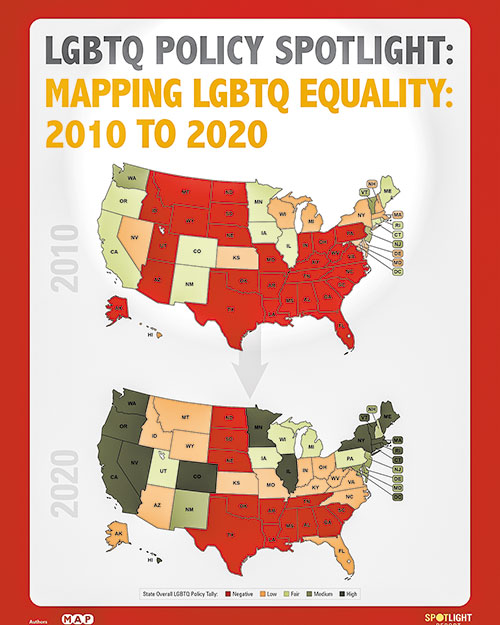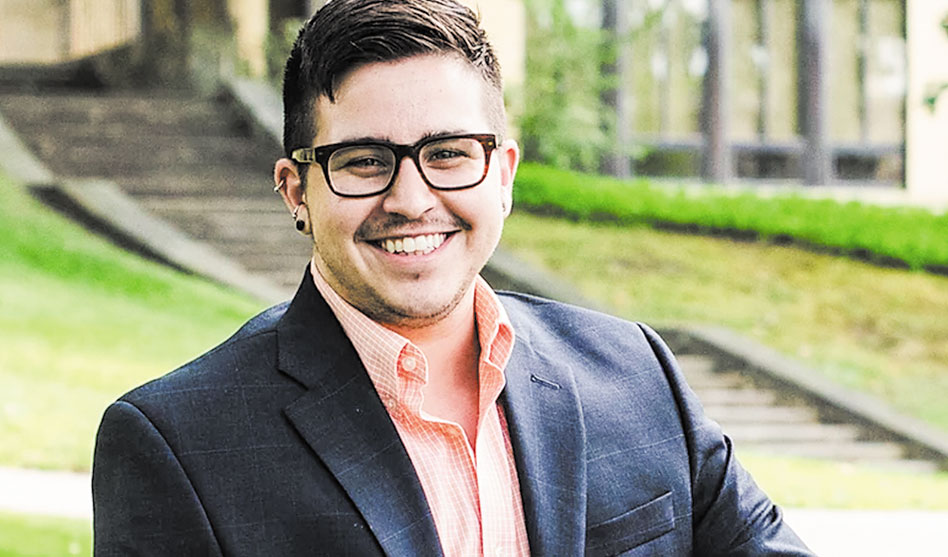Logan Casey
Texas ranked as equality negative
James Russell | Contributing Writer
james.journo@gmail.com
A report chronicling the past decade for the LGBT rights reveals mixed results at the federal and state levels.
“The past decade has included incredible legal, political and social progress for LGBT people, such as the right to marry, the end of Don’t Ask,
Don’t Tell and increased support for LGBT equality,” said Ineke Mushovic, executive director of Movement Advancement Project, the organization that issued the report. “But this report shows there are also many areas of the country where change has been slow: shockingly, more than half of states still lack basic employment nondiscrimination protections for LGBT people.”
Mapping LGBT Equality: 2010 to 2020 examines nearly 40 laws and policies across all 50 states, the District of Columbia, and the five U.S. territories and ranks them as High, Medium, Fair, Low or Negative Equality states. Fourteen states and D.C. earned the highest ranking.
The 40 laws are lumped into seven categories: relationship and parental recognition, health care access, religious exemptions, identity documents, nondiscrimination and criminal justice laws.
 LGBT people that live in states with low or negative equality have few statewide legal protections or even have harmful laws.
LGBT people that live in states with low or negative equality have few statewide legal protections or even have harmful laws.
Texas is among the 12 states ranked negatively.
California has the nation’s highest level of equality with a tally of 34.75 out of a possible 38.5, while Alabama has the lowest tally, a negative-6.5 out of 38.5. Texas scored a negative 1 1/2 out of 38.5.
Yet the number of LGBT people living in “negative” equality states fell by more than half. In 2010, nearly half of LGBT people lived in negative equality states. In 2020, that number has decreased to 20 percent.
The number of LGBT people living in “medium” or “high” equality states increased dramatically, from 6 percent in 2010 to nearly half of all LGBT people in 2020.
Logan Casey, a policy researcher for MAP who authored the report, said, “The report’s major finding is that, while there has certainly been tremendous progress for LGBT people in the past 10 years, that progress hasn’t unfolded evenly across the country. In the past decade, we’ve seen nationwide progress in nondiscrimination protections, conversion ‘therapy’ bans and other laws protecting LGBT youth, health care access, and more.”
But as a state, Texas has barely budged.
“It was a negative equality state in 2010 and it remains one in 2020,” Casey said.
During the past three state legislative sessions, for instance, LGBT advocates have been on the defense. The 84th session saw a record number of anti-LGBT bills filed, and the 85th was consumed by anti-transgender bathroom restrictions.
After Democrats flipped 12 seats in the House and two in the Senate in 2018, the state’s Republican leadership largely stayed away from social issues during the 86th session ion 2019. While 20 bills discriminating against LGBT people were filed, only one –– a watered down religious freedom bill –– passed.
Winning by defeating bills is still a win.
“In some states, these victories look like LGBT protections being enshrined into law, while in other states — like Texas — these victories more often look like preventing harmful and discriminatory bills from becoming law, or preventing the undermining of what protections might exist,” Casey noted.
The wins were also similar to other legislative sessions around the country. According to the Equality Federation and Human Rights Campaign, in the 2019 legislative session, only seven out of at least 102 anti-LGBTQ bills that had been filed actually passed.
“MAP has done an excellent job with this report, giving us a tangible data snapshot of how policy has a profound effect on quality of life for LGBT populations,” said Emmett Schelling, the executive director for the Transgender Education Network of Texas. “It’s frustrating, to say the least, to see such a patchwork across our nation regarding foundational issues such as nobody should lose their employment and housing simply for who they love or who they are. That should be a common sense issue for us to all agree on, but instead Texas has continued to languish among the bottom states when it comes to progress and common sense.”
But, Casey said, popular opinion is on LGBT people’s side.
“Legislators are the ones who are lagging behind,” he said.













